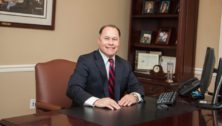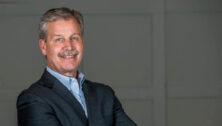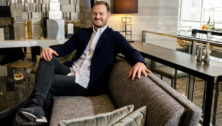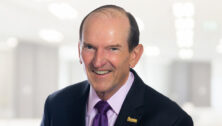Bucks County Leadership: Jim Cawley, President, Rosemont College and 32nd Lieutenant Governor of Pennsylvania
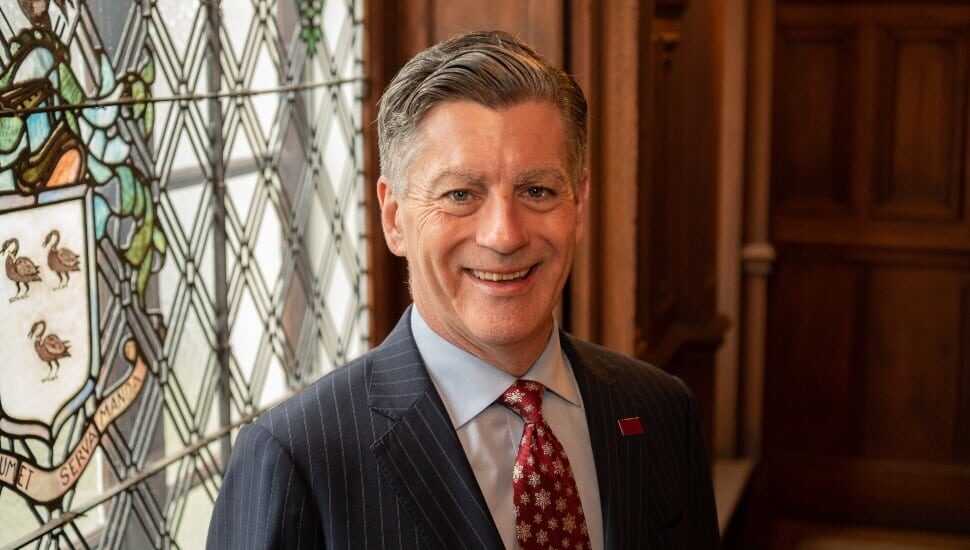
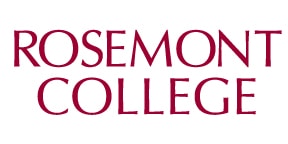
Jim Cawley, President of Rosemont College, spoke to VISTA Today about his idyllic childhood growing up in Levittown, his involvement in a diverse range of high school extracurricular activities and his first taste of leadership as the editor of his high school newspaper. A first-generation college student, Cawley attended Temple University for undergrad and law school because he knew he wanted to stay near Philadelphia.
Cawley also discussed the many mentors who helped and supported him throughout his political career and the advice from his father that made him a better person and manager. Finally, he shared what sets Rosemont College apart and why a liberal arts education is an asset for any career.
Where were you born and where did you grow up?
I was born at Lower Bucks Hospital in Bristol, in 1969, and I grew up in Levittown. We were the third family to live in our house.
What memories do you have of growing up in Levittown?
Growing up in Levittown was great. We would walk out of the house in the morning and say, “Bye, mom. Bye, dad,” and not come home until dinnertime.
It was a wonderful mix of people. My father was a mailman, and our next-door neighbor was an engineer. The neighbor next to them was an over the road truck driver. They were all helping to make the first fully planned community and make it go.
You mentioned your father was a postman – what did your mother do?
When she wasn’t doing the hardest job, raising my younger sister and I, my mom was a secretary. She worked for a long time at the Levittown Library as a receptionist.
Did you play any sports when you were growing up or in high school?
I tried everything at least once. I played baseball, basketball and, in third grade, I played football. During high school, I ran track, and I was on the golf team as well. I enjoy being active, even though I’m not very good at any sport.
When you look back at high school, what did you do to distinguish yourself?
I was engaged in just about every extracurricular activity there was: the German club, the chess club and both the wilderness and the outdoors club, because I loved hiking, fishing and camping. When I became an upperclassman, I was the editor-in-chief of the school newspaper and an associate editor for the yearbook.
Where does that drive come from?
I’ve always believed that it is incumbent on all of us to be active citizens, whether in our community or philanthropic pursuits. I think that came to me at an early age.
Naturally, or from of your parents?
A little bit of both. My dad was very active in Irish American cultural activity. It’s kind of a strange thing for a Republican to say, but he was active in his union, as well. My mom was more active civically and locally.
I did see that and it did rub off on me, but it was also an inherent desire. The more I engaged, the more I liked my high school experience.
Was there a specific moment, Jim, when you first realized you were bringing something special to the table?
There were two – on either end of me being the editor of the school newspaper. Our school newspaper was all but defunct. I had never even written an article for it when I became editor. My English teacher, Mary Bonner, told me that she and Mr. O’Neill, the moderator of the school newspaper, had been talking about who the next editor should be.
I started pitching my friend. She said, “No, we’re thinking of you. People will follow you. You will be able to motivate people and improve this.” I thought, “I’ve got to try this.” By the end of my senior year, both she and Bob O’Neill said, “You proved us 100% correct.”
Those two things – first, hearing somebody say, “You can lead people,” then doing it and being affirmed at the end – that was transformational.
What do you think they saw in you as a very raw 15-year-old?
Marvelous question – it would probably be better to ask them. Maybe, from afar, they saw me interact with peers and saw that there was a positive reaction to the way I would coax or cajole people, bringing them together.
Did you have any jobs in high school?
I did. My first job ever was as a paper boy for the Bucks County Courier-Times. I had that job for three or four years.
Then I went through a whole host of traditional jobs. I sold shoes during college. I worked in a department store, Boscov’s. I finally ended up getting a job at a local independent pharmacy, probably in my sophomore year of college. I stuck with that in the summers and holidays all the way through law school.
What lessons did you take from those jobs that stayed with you?
What stayed with me, particularly from my job as a paper boy, is that people appreciate good service. Going the extra mile does translate into appreciation, both financially and otherwise.
My last time collecting, I went to this one person’s house and said, “This is my last time. I’m turning over the route to someone else.” And he said, “You know, you’re the best damned paper boy we’ve ever had.” He reaches into his wallet – now, this is 1986 or ’87 – and hands me a $20 bill. I felt like I was on top of the world.
Then, 15 or 20 years later, I was at the Knights of Columbus, and the bartender is the son of the man who gave me the $20. I tell him this story – “Your dad made me feel like a million bucks that time. He told me I was the best paper boy he’d ever had.” The bartender said, “What? My brothers and I all had that route before you!”
What about music? What floated your boat, music-wise?
My mom, in particular, was very committed to music. So, Christmas, to me, was the Beach Boys’ Christmas album and Johnny Mathis. Later, I got into the Beatles in early high school. It wasn’t cool then to be interested in the music of the time, ‘80s music, but now, quite frankly, I love the ‘80s on 8 on Sirius XM because it takes me right back to those times.
You were a serious student – you could have gone anywhere to college. Where did you decide to go?
I chose Temple. At the time, because I had that involvement with the newspaper, after years of thinking I would be a lawyer, I decided that I wanted to go into broadcast journalism. Neither of my parents graduated high school, let alone college. My mom went to what they called commercial school to learn how to be a secretary. My dad dropped out of school because his dad passed away, and he had to help support his seven younger brothers and sisters.
So, they didn’t understand the whole college selection process, and I certainly didn’t. I looked around, asking, “What’s a good journalism school?” I was packing to go to the University of Indiana in Bloomington, and at the last minute, I decided I wanted to end up in the Philadelphia area. I went to Temple as a journalism major for about a year and a half, and then I realized, with all due respect to the person who is the weekend anchor in Fargo, N.D., I did not want to be him or her. I’m too much of a homebody.
What major did you switch to?
I was very intent on graduating in four years because my father was convinced that I was going to be that John Belushi character in “Animal House.” I had an equal number of credits in both history and political science. I asked my professors and fellow students, trying to figure out what would be best. Finally, after a couple of days of getting nowhere, I pulled out a quarter, it came up heads, and I was a political science major.
Did you know you wanted to go to law school at that point?
Yes, I was back on that track. I thought that would be the most logical next step.
Was Temple a good choice for you in the end?
Temple worked out very well for me. I got involved there, primarily in student government, and had an absolute ball in my time there.
What did you do in student government? Did you run for class president?
No, no, no. I stayed where the real power was. I was the speaker of the general assembly at Temple three times. The speaker of the general assembly had a lot more power than the president did.
When you finished undergrad, where did you go to law school?
I went to Temple. I had just enough money to apply to one school, and I thought that school was going to be Penn. But I talked to the dean of students at Temple one day. She herself was a dual alum – undergrad and law school at Temple. She said, “If it has to be one school, make it Temple.”
Looking back over the last 30 years, Jim, who were the people who saw promise in you and opened up doors?
Well, certainly that dean of students, Kristl Wiernicki. And the assistant vice president for student affairs at Temple, Jim Fitzsimmons, who went on to head up Malvern Retreat House. He, too, was very instrumental.
My later mentors included Mark Schweiker – our families knew each other for a long time, and he provided a lot of opportunities. When Mark’s race for lieutenant governor started, it was just the three of us – me, Mark and his blue Pontiac Bonneville – driving everywhere. I learned a lot from him.
Senator Tommy Tomlinson, who is retiring this year, took a risk on a 24-year-old, gave him a job and, over the course of 10 years, I went from basically being on the front lines with Tommy to being his chief of staff.
Harry Fawkes, the former chairman of the Republican party in Bucks County, took a risk, too, in taking somebody who perhaps didn’t have as high of a name ID as some others and encouraging people to support me for county commissioner.
And then, all those folks along the way who provided kindness and help. Later, when I made the move statewide, it, frankly, would not have been successful without Bob Asher. At times, it wasn’t easy for him – it was a very active primary that year. Now, we have this dear, lifelong friendship.
I would be extremely remiss not to mention the person who helped propel me every day, which is my wife Suzanne. She’s the most transformational figure in my life.
What are the challenges and opportunities you’re getting your hands around at Rosemont College?
Rosemont is an incredibly special place. It has a strong, dedicated faculty; staff that truly care for this institution; a student body that’s respectful but inquisitive and hungry for knowledge and a setting that speaks to me. When my parents used to dream about sending little Jimmy to college, they fell asleep dreaming about a setting like Rosemont.
We focus on those first-generation college students and giving them an opportunity they may not get elsewhere. While there are others in that first-gen space and doing it well, they’re not our size.
There are students out there who need that individualized attention, that feeling of community and family, to be successful, and that’s what Rosemont is doing. We’re small, admittedly – just under 800 students – and we’d like to grow, but we’re never going to be big. We would lose that identity of who we have been for 101 years.
We’re looking at our course selections now, figuring out what we’re doing that people like and what maybe needs to be phased out and what new programs we can bring in to make us even more competitive in the marketplace. We’re going to grow in areas like cybersecurity and education and continue a robust commitment to business.
There’s a certain connotation to a liberal arts college education, that somehow it’s not practical. Well, just with what I mentioned – business, education, cybersecurity – we’re providing that classical education and augmenting it with practical skills. What’s interesting is that when CEOs are asked, “What’s an ideal candidate for a job?” we often hear them say, “They have to be skilled in their profession, but what I can’t teach them is how to think and how to solve problems.” And that’s what a liberal arts education does.
What about the physical facilities?
Earlier this year, we cut the ribbon on a renewed residence hall, Mayfield Hall. It was one of our original buildings and was in great need of an overhaul. We scooped the inside out and rebuilt it with state-of-the-art heating, plumbing and electric.
Jim, what do you do with all your free time?
It’s a balance between my Rosemont family and my family. My wife and my son have pitched in numerous times. My wife, who’s in real estate, is trying to figure out what opportunities and outside-the-box things we could consider here. My son Nick, who’s 15, has been on campus several times.
I do play golf, and in the winter months, there’s a place I go that has a simulator. I read books – normally historical non-fiction. And I sleep.
Jim, what’s something big that you’ve changed your mind about?
That public service isn’t the only way to leave a mark. I used to be so driven by the need to be an elected official, do all the things I thought needed to be done and get to the next rung on the ladder. After what I’m sure some people thought was a pause – and it may still be a pause – I realized, in particular, during my time with the United Way, there are many ways in which you can leave a mark.
What keeps you hopeful and optimistic, Jim? It’s a crazy world out there, and there’s a lot to be pessimistic about.
My inherent belief in two things: the goodness of people and the promise of the United States of America. I do believe most people, at their core, are good and have good intentions, even if I don’t necessarily agree with them. And I believe in American exceptionalism. The blessing of living in the United States, to me, is so overwhelming that it keeps me positive.
Finally, Jim, what’s the best piece of advice you ever received?
The one that comes to mind came from my father. He always said, “You get what you inspect, not what you expect.” He was a manager during his last 10 years at the Postal Service. He said, “Don’t stifle people from doing what they’re doing, don’t micromanage, but make sure you know what’s going on. And make sure they know that you know what’s going on.”
He would tell me that from a very young age. I would say, “Well, I thought it would just happen!” And he would say, “No, you have to look and see.” It helped me to be a better student, a better person, a better leader.
Connect With Your Community
Subscribe for stories that matter!
"*" indicates required fields


























